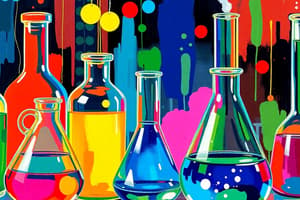Podcast
Questions and Answers
Analytical chemistry solely focuses on the qualitative analysis of substances.
Analytical chemistry solely focuses on the qualitative analysis of substances.
False (B)
The process of separation in analytical chemistry is used to isolate specific chemical species from a mixture.
The process of separation in analytical chemistry is used to isolate specific chemical species from a mixture.
True (A)
Quantitative analysis in analytical chemistry determines the identity of the chemical species.
Quantitative analysis in analytical chemistry determines the identity of the chemical species.
False (B)
Modern analytical chemistry exclusively relies on traditional methods without any scientific instruments.
Modern analytical chemistry exclusively relies on traditional methods without any scientific instruments.
Identification of the analyte substance is achieved through qualitative analysis in analytical chemistry.
Identification of the analyte substance is achieved through qualitative analysis in analytical chemistry.
Analytical chemistry generally involves the use of modern, sophisticated ______.
Analytical chemistry generally involves the use of modern, sophisticated ______.
Classical qualitative methods include techniques like precipitation, extraction, and ______.
Classical qualitative methods include techniques like precipitation, extraction, and ______.
Identification in analytical chemistry may involve differences in ______, odor, melting point, or boiling point.
Identification in analytical chemistry may involve differences in ______, odor, melting point, or boiling point.
Classical quantitative analysis often relies on changes in ______ or volume to determine the amount of a substance.
Classical quantitative analysis often relies on changes in ______ or volume to determine the amount of a substance.
The principles behind modern analytical instruments can be traced back to more ______ techniques.
The principles behind modern analytical instruments can be traced back to more ______ techniques.
Study Notes
Overview of Analytical Chemistry
- Branch focused on the analysis of different substances.
- Encompasses separation, identification, and quantification of matter.
Techniques in Analytical Chemistry
- Utilizes both classical techniques and modern scientific instruments.
Methods of Analysis
-
Separation Process:
- Isolates specific chemical species from a mixture for further analysis.
-
Identification of Analyte:
- Achieved through qualitative analysis, which determines the presence or absence of a substance.
-
Quantitative Analysis:
- Assesses the concentration or numerical amount of the analyte within a mixture.
Overview of Analytical Chemistry
- Analytical chemistry integrates modern, advanced instruments while relying on traditional foundational principles.
- The field encompasses techniques for separating, identifying, and quantifying various types of matter.
Classical Qualitative Methods
- Techniques include precipitation, extraction, and distillation which enable separation of components within mixtures.
- Identification methods leverage distinct physical and chemical properties such as:
- Color variations
- Odor characteristics
- Melting and boiling points
- Levels of radioactivity
- Reactivity with other substances
Classical Quantitative Analysis
- Quantitative methods focus on measuring mass or volume changes to determine the amount of a substance present in a sample.
- These classical techniques form the basis for more advanced analytical methods utilized today.
Studying That Suits You
Use AI to generate personalized quizzes and flashcards to suit your learning preferences.
Description
This quiz covers the essential aspects of analytical chemistry, including techniques for separation, identification, and quantification of substances. Explore both classical and modern methods utilized in the analysis of chemical materials.





